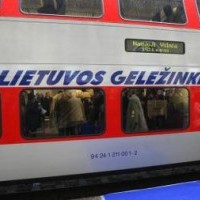SOE profits up 350% in 2011

The results of state-owned enterprises (SOEs) keep improving and the net profit of SOEs (including special taxes to the State) was LTL 246.6 million in 2011, which was 3.5 times more than the previous year (this sum excludes losses of LTL182 million due to the bankruptcy of the Bankas Snoras).
“SOE reform has already brought tangible results: the transparency of SOEs is increasing, they operate more efficiently and pay higher dividends. Moreover, the attitude towards SOEs has been changing, and SOEs are increasingly expected to follow the best practice of corporate governance and performance efficiency rather than remain a tool for policy implementation. We therefore expect that future Governments will continue to follow the enterprise management principles which are acknowledged world-wide,” Rimantas Žylius, Minister of Economy, said when presenting the third Government report on the SOEs.
In 2011, AB Lietuvos Geležinkeliai had the best results among SOEs and increased its profit from LTL69 million to LTL150 million.
In 2011 its return on equity (RoE) was 5.6%. The net profit of one tonne cargo transportation for one km increased by 28.6% or up 0.9% due to increased freight and transportation tariffs.
The profit of AB Klaipėdos Nafta surged 1.7 times to LTL45 million. The RoE increased from 5.8% to 9.5% in 2011.
In 2011, AB Lietuvos Paštas earned LTL0.7 million for the first time in a four year period, while in 2010 its losses were LTL10 million. Despite the increasing volume of sales, AB Lietuvos Paštas decreased the cost per service unit by 5.3%, to 87 cents.
The net loss of the Visaginas Nuclear Power Plant Group (VNPP Group) grew from LTL39 million to LTL109 million. The loss increased mainly due to revaluation costs of the emission allowances by AB Lietuvos Energija.
Forestry enterprises increased revenue from LTL414 million to LTL545.5 million because of increased sales volumes and wood prices. The amount of raw material tax paid by these enterprises to the State budget doubled and amounted to LTL75.3 million.
However, operating costs of forestry enterprises grew by 16% (before taxes on property and raw materials, forest restoration, protection and management costs and excluding LTL29.9 million which was written-off due to the bankruptcy of the Bank Snoras).
The Ministry of Economy has calculated that as a result of the non-commercial functions – special obligations – an unearned profit of SOEs amounted to LTL400 million.
Compared with the companies of the private sector in Lithuania, the SOEs should earn another LTL360 million from commercial activities. AB Lietuvos Jūrų Laivininkystė, AB Lietuvos Paštas and a few smaller SOEs still need to considerably improve their performance.
SOE dividends
This year, SOEs will pay all time high dividends and profit contributions of more than LTL500 million. Before 12 June, SOEs had allotted LTL213 mill. in dividends and contributions to the national budget.
In the second half of 2012, the VNPP Group plans to transfer dividends of LTL275 million. Also, LTL34 million of profit contributions have not yet been allotted by the Klaipėda State Seaport Authority.
“As a result of the bankruptcy of Bankas Snoras the total amount of SOE dividends and profit contributions will be LTL65 million less than previously planned. Nevertheless, this is 12 times better than 2010, when the reform of the SOEs was not started. In 2010, the dividends were only LTL42 million,” said Rimantas Žylius.
Municipality-owned enterprises
For the first time, the 2011 Report on SOEs also covers the management results of 262 municipality-owned enterprises (MOEs). In 2011, the assets of MOEs was LTL8.5 billion, revenue amounted to LTL2.4 billion and the net loss was LTL833,000.
The highest value assets of LTL1.8 billion was owned by the Vilnius City Municipality and the highest turnover of LTL503 million was achieved by the Kaunas MOE.
The worsening results of MOEs (the net result of the MOEs portfolio was LTL29.5 million profit in 2010 and LTL833,000 loss in 2011) were determined by the falling profits of the centralized heat supply companies due to rising fuel prices.
According to Žylius, the municipalities should follow the Government example and devote much more effort to increasing the efficiency and transparency of MOEs.
In the meantime, most municipalities do not devote sufficient attention to the transparency and accountability of MOEs and provide little performance data to the public. Moreover, some MOEs do not comply to the provisions of the law and are behind schedule in presenting financial reports to the Register of Legal Entities.







